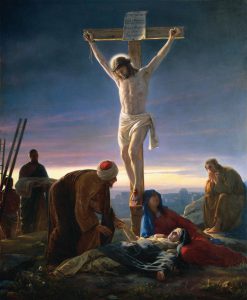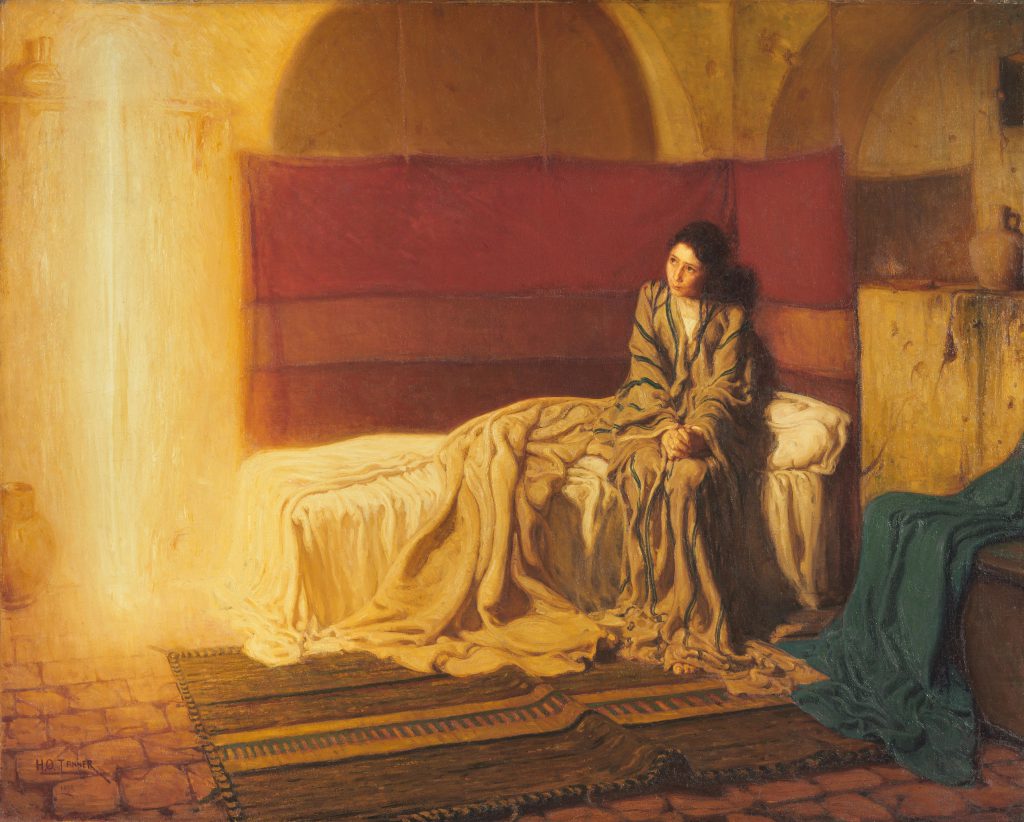At a recent wedding, because it was relevant for the couple, I admitted during the homily that I’m very proud. Afterwards, someone said to me, ‘I’m glad you said that, because you are proud.’ I mentioned that our desire for excellence can sometimes also be a cloak for pride: We want to do great things for God, but it’s also for our own ego. St. John of the Cross talks about how secret pride shows up in spiritual people. Here are a few of his examples, which act like an examination of conscience three days before Christmas, where Jesus heals us with His humility:
1) We speak of spiritual things so as to impress people, or condemn people who aren’t as devoted as we are.
2) We want other people to notice our love of God, to see our good works. So, when I preach, in a somewhat hidden way I hope to impress people; when we altar serve, we draw attention to ourselves in little ways; when we sing, we may hope people notice how good we are; same for lectors, ushers, hospitality personnel; even when we come to Mass, we may hope someone will notice what we’re wearing. These are all normal temptations. We shouldn’t be discouraged or ashamed by them. It doesn’t mean we stop serving, but we ask Jesus for healing.
3) We try to impress our confessor by confessing “sins in the most favourable light”, or find a different priest when confessing embarrassing sins.
4) We minimize our faults, are discouraged by them (because we incorrectly think we’re already saints), and become impatient and angry with ourselves (St. John of the Cross, The Dark Night, 1, 2, 1-5).
Let’s now meditate on the First Reading, which reveals God’s humility, Jesus’ humility, and their love of humility: “The Lord says to his people: ‘You, O Bethlehem of Ephrathah, who are one of the little clans of Judea, from you shall come forth for me one who is to rule in Israel, whose origin is from of old, from ancient days” (Mic 5:2). This is the famous prophecy that Jesus would be born in Bethlehem, roughly 700 years before it would happen. Even today, the idea that the most important thing in the world, God’s becoming man, would happen in a little village seems incongruent. Think of how movies love to have their stories take place in New York; world events are scheduled in capital cities; and, if we were to launch a new product, we wouldn’t do it in Chilliwack, but in Vancouver. The Reading was written in the eighth century B.C., when the Assyrian empire in the north was ready to attack the small Jewish kingdoms in the south, which eventually did happen in 722 B.C. The town of Bethlehem was nothing compared to that empire, and yet God promised that He would be born there.
God’s greatness is revealed in powerlessness. Strength isn’t revealed in those who are powerful, but in those who love. Notice that God revealed His love and strength in Bethlehem and Golgotha—seemingly powerless (Joseph Ratzinger, Salt of the Earth, 20).
God deserves glory, yet He’s humble. We don’t deserve glory, and so we should be humbler.
When we come to Mass, as mentioned three Sundays ago, it’s good if we dress a step up, for God’s sake, to remind us that He’s that important to us; we even dress up to give joy to others. If people compliment us, we can respond, ‘Thank you! Praise God!’ That’s good! But it’s not for our pride.
When the Reading says, ‘whose origin is from of old, from ancient days,’ this is a hint that the messiah would be divine. What’s interesting is that this divine Person chooses to be born in a place called ‘Bethlehem’ meaning ‘house of bread,’ which is fitting because, during Mass, He chooses to be humble, taking the appearance of bread, so that we can consume Him.
If we serve at Mass, we might want to make a prayer of humility beforehand: ‘Lord Jesus, my love, help me to serve so that You receive the glory and people see Your goodness. Help me to do my best, but let me disappear.’ The idea of disappearing isn’t because we’re worthless; actually, we’re loved infinitely and this makes us want to love(!), but we’re not the center of attention. St. John the Baptist said about Jesus, “He must increase, but I must decrease” (Jn 3:30).
And if we’re assisting at Mass (‘assisting’ being the correct term for praying at Mass), then we could pray, ‘Lord Jesus, my love, help me to assist at Mass so that You receive the glory and people around me are edified. As I receive Your love, let me share that love with those next to me.’
Here are three examples of what St. John of the Cross says about those who “are advancing in perfection”:
1) “They think everyone else is far better than themselves.” Let’s explain this because it’s nuanced. It’s objectively impossible that sinners are better than saints, so we can’t believe that people doing horrible crimes are better than people who aren’t. However, when we consider all the graces we’ve been given and all the graces we’ve wasted, then we can think we’re worse. If I think about all the love Jesus has given to me and then how I’ve hurt Him, I have no reason to be proud; I feel like the worst—and that’s good. I don’t hate myself because Jesus died and rose for me, but I’m so humbled. So, when I try to teach you how to serve at Mass, I know what it’s like to be very proud at Mass, and so I teach from a position of not being better.
And please don’t misunderstand St. John of the Cross. When you go for a job interview, don’t go in and say, ‘I’m the least qualified candidate. Everyone else is better than I am.’ Could you imagine if you go for surgery and the doctor says, ‘I’m the worst surgeon in the world’? No, your job is not to talk about your weaknesses but to give people confidence.
2) The more good we do, the more we are aware of our debt to God. When proud people do well in life or life really goes well for them, they leave God to the side, but humble people, when good things happen to them or they start succeeding in life, turn to God because they’re so grateful.
3) “These souls would give their life’s blood to anyone who serves God, and they will do whatever they can to help others serve Him” (The Dark Night, 1, 2, 6-8). Since God has given us everything, we don’t bury our talents but use them to serve others. We go out of our way to greet people, to be cheerful, so as to brighten their day!
This brings us to our Mother Mary. The Reading refers to her anonymously, “Therefore he shall give them up until the time when she who is in labour has brought forth” (5:3). God will give up the Jewish people to their enemies to humble them until Mary is ready to give birth. Our Mother is the humblest person in the world, because she knows that all of her blessings come from her Son Who saved her.
There are two ways to save people, either by intervention or by prevention. Some people are saved from drug addiction by intervention and rehabilitation. Others are saved by prevention, because they were raised in good homes and protected from the temptation (Scott Hahn, Reasons to Believe, 110). That’s how our Mary was saved by Jesus. She is, therefore, completely dependent on Him. She knows that, without Him, she would be nothing. Knowing Jesus’ grace, she does not look down on anyone but does everything she can to help them meet her Son.
 If I could just ask one important favour today, please: Four weeks ago, we did the Christ the King Challenge but 54 cards didn’t make sense and 126 people said that they make Jesus the center of their lives for the first time in the past 12 months, yet 126 people did not raise their hands for that question. So, today, we’ve remade the cards to make it simpler. Because these statistics are so important to understand our parish’s growth (and Archbishop Miller is interested in it), I’m asking if you could fill them out again, please.
If I could just ask one important favour today, please: Four weeks ago, we did the Christ the King Challenge but 54 cards didn’t make sense and 126 people said that they make Jesus the center of their lives for the first time in the past 12 months, yet 126 people did not raise their hands for that question. So, today, we’ve remade the cards to make it simpler. Because these statistics are so important to understand our parish’s growth (and Archbishop Miller is interested in it), I’m asking if you could fill them out again, please.
So, my card would look like this: Yes, Jesus is the center of my life; no, I did not make Him the center in the past 12 months because I did it years ago. Hopefully, we’ll get clear answers this time. Thank you for your humility in doing this again!



